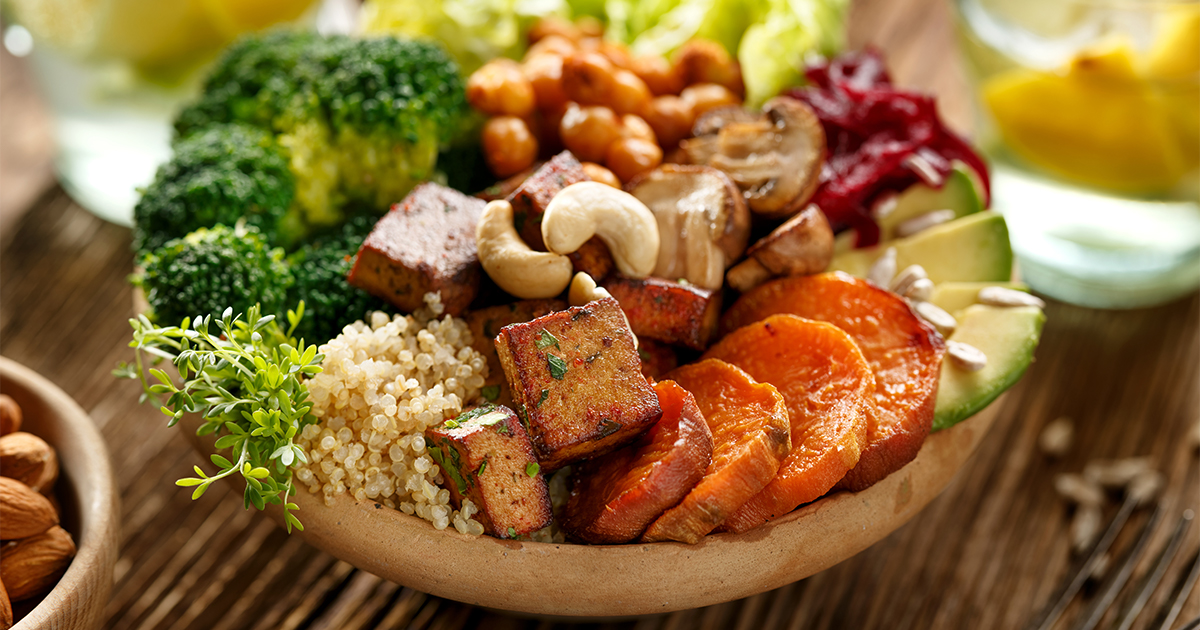Want to lose weight? Want to improve your digestion? Here is a tip. Chew your food thoroughly. Why? What other benefits does chewing food offer? You may be surprised!
Helps Weight Management and Satiety
Researchers at Iowa State University found that chewing food thoroughly — 40 times before swallowing–instead of 15 times—decreases hunger, the preoccupation with food, and food intake in healthy young adults.1 A meta-analysis also revealed that chewing significantly reduces self-reported hunger.2
Why? Chewing regulates our satiety and hunger hormones. Eating the same meal for 30 minutes instead of wolfing down our food in 5 minutes increases gut compounds that reduce hunger and promote satiety.3 For example, chewing increases CCK (cholecystokinin), a hormone that suppresses appetite and promotes fullness and satiety. Thorough mastication decreases the hunger hormone ghrelin.4 Chewing also improves metabolism.
Chew Slowly, Decrease the Risk of Diabetes!
Chewing slows us down. Rapid eaters are 2 1/2 times more likely to develop diabetes.5 One study found that waiting 30 seconds in between bites of food allows children to realize they are not hungry and avoid overeating.6 It takes about 15 minutes for the satiety reflex to kick in. Remarkably, a study of 60,000 adults found that those who ate at a normal speed were 29 % less likely to be obese than those who wolfed down their food. Get this now, slow eaters were 42% less likely to be obese than fast eaters!7
Improves Digestion
Digestion begins in the mouth! Chewing improves the digestion of starches and the absorption of nutrients. Just chewing your food and spitting it out increases the secretion of stomach acid, digestive enzymes, and insulin.4 Our saliva contains tongue lipase which begins the digestion of fats, and salivary amylase which plays a major role in the digestion of starches. The more time food is in our mouth, the longer these digestive enzymes can work, making it easier for the other digestive organs. Well-chewed food puts less strain on the esophagus. Thoroughly chewing foods increases the energy expenditure associated with the digestion, absorption, and storage of foods.
Improves Oral Immunity
Chewing foods properly and not aggressively stimulates certain immune cells in our mouth that protect it from common fungal and bacterial infections.8
Improves Cognitive Ability as We Age
Chewing activates several brain regions essential for cognitive processing, including the hippocampi and prefrontal cortex. The hippocampi, located in the temporal lobes, are involved in memory and mood regulation. The prefrontal cortex operates like a CEO and performs executive actions such as focusing, discerning, and choosing a course of action.9
Having good teeth and chewing well improves blood flow to the brain. Unfortunately, having few teeth reduces blood flow to the brain. A Swedish study of over 500 elderly adults showed that individuals who had difficulty in swallowing solid foods had a significantly increased risk for cognitive impairment, after adjusting for factors as mental health and education.10
What About Juicing?
Drinking a cup of freshly made juice, or better yet, a smoothie will help supply you with phytonutrients if you do not like whole fruits and vegetables. But don’t rely on juicing for permanent weight loss success. Soluble fiber stabilizes blood sugars and promotes satiety (a sense of fullness) to achieve and then maintain a healthy weight. Insoluble fiber, however, is lost in the juicing process.
Juices don’t usually have significant fiber and protein which keep us full and help maintain muscle mass for a healthy weight. Finally, consumption of fruit juices rapidly increases blood sugar. Consuming excess fruit juice also increases triglyceride levels. So, if you are obese or have either pre-diabetes or diabetes, forget the fruit juice. Choose to eat whole fruits like apples and berries. Whole fruits and vegetables have a higher nutritive value and can help the body to naturally detoxify itself.11
Conclusions
Wolfing down our food and primarily getting our nutrients from juices or smoothies are not conducive to optimal health. (Although a cup of freshly made juice a day might be advantageous to some.) What we chew, how we chew, and how fast you chew greatly impact our health.
Works Cited:
- Sophie Miquel-Kergoat Effects of chewing on appetite, food intake and gut hormones: A systematic review and meta-analysis. Physiology & Behavior 151 (2015) 88–96.
- Alexander Kokkino. Eating Slowly Increases the Postprandial Response of the Anorexigenic Gut Hormones, Peptide YY and Glucagon-Like Peptide-1. The Journal of Clinical Endocrinology & Metabolism, Volume 95, Issue 1, 1 January 2010, Pages 333–337.
- Chew on this: study finds additional chewing reduces food intake in young adults. April 16, 2012. www.news.iastate.edu/news/2012/apr/chewing#sthash.Jq5uStAu.dpuf[↩]
- Sophie Miquel-Kergoat Effects of chewing on appetite, food intake and gut hormones: A systematic review and meta-analysis. Physiology & Behavior 151 (2015) 88–96.[↩]
- Alexander Kokkino. Eating Slowly Increases the Postprandial Response of the Anorexigenic Gut Hormones, Peptide YY and Glucagon-Like Peptide-1. The Journal of Clinical Endocrinology & Metabolism, Volume 95, Issue 1, 1 January 2010, Pages 333–337[↩]
- Yuka Hamada. The number of chews and meal duration affect diet‐induced thermogenesis and splanchnic circulation. Obesity vol. 22:5. May, 2014.[↩][↩]
- European Society of Endocrinology. “Eating fast increases diabetes risk.” ScienceDaily, 7 May 2012. www.sciencedaily.com/releases/2012/05/120507210038.htm.[↩]
- University of California – San Diego. “Chewing slowly helps prevent excessive weight gain in children.” ScienceDaily, 16 December 2015. www.sciencedaily.com/releases/2015/12/151216151736.htm.[↩]
- Yumi Hurst, Haruhisa Fukuda. Effects of changes in eating speed on obesity in patients with diabetes: a secondary analysis of longitudinal health check-up data. BMJ Open, 2018; 8 (1): e019589 DOI: 10.1136/bmjopen-2017-019589[↩]
- Research reveals surprising health benefits of chewing your food. January 17, 2019. www.manchester.ac.uk/discover/news/research-reveals-surprising-health-benefits-of-chewing-your-food.[↩]
- Kin-ya Kubo. Chewing, Stress-Related Diseases, and Brain Function. BioMedical Research. Volume 2015 | Article ID 412493 | [↩]
- Karolinska Institutet. “Chewing ability linked to reduced dementia risk.” ScienceDaily. ScienceDaily, 4 October 2012. www.sciencedaily.com/releases/2012/10/121004093038.htm.[↩]
- Harvard Health Publish, Harvard Medical School. Juicing — Fad or Fab? July 2015. www.health.harvard.edu/healthy-eating/juicing-fad-or-fab[↩]

